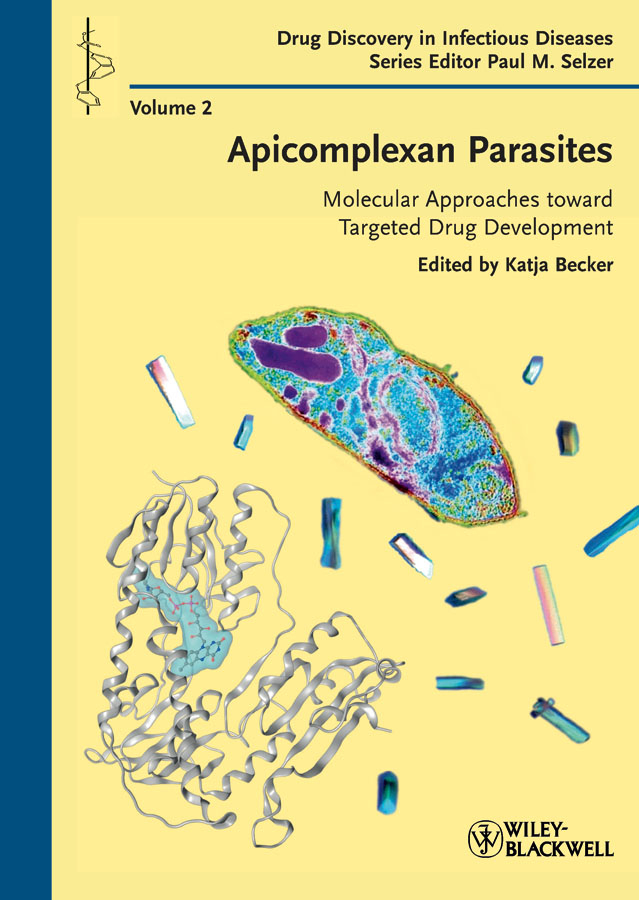
Apicomplexan parasites: molecular approaches toward targeted drug development
Becker, Katja
Selzer, Paul M.
This handbook deals with the discovery of drugs to fight apicomplexan parasites, a group of endoparasites that includes the causative agents of malaria, toxoplasmosis, and babesiosis, among others. Written by renowned scientific experts from academia and industry, the book focuses on current drug development approaches for all apicomplexan diseases, thus making it attractive to a large audience ranging from research labs in academia to the human and veterinarian pharmaceutical industry. This is the second volume in our exciting book seriesDrug Discovery in Infectious Diseases, edited by Prof. Paul M. Selzer. INDICE: Foreword. Preface. List of Contributors. Part One Screening, Bioinformatics, Chemoinformatics, and Drug Design. 1 Drug Discovery Approaches Toward Anti-Parasitic Agents (Andreas Rohwer, Richard J. Marhöfer, Conor R. Caffrey, and Paul M. Selzer). 2 New Bioinformatic Strategies Against Apicomplexan Parasites (Thomas Dandekar and Ke Xiao). 3 Sorting Potential Therapeutic Targetsin Apicomplexa (Jan A. Hiss and Gisbert Schneider). 4 Alternatives to Drug Development in the Apicomplexa (Theo P.M. Schetters). Part Two Metabolic Pathways and Processes Addressed by Current Drug-Discovery Approaches. 5 Energy Metabolism as an Antimalarial Drug Target (Esther Jortzik and Katja Becker). 6 Polyamines in Apicomplexan Parasites (Ingrid B. Müller, Robin Das Gupta, Kai Lüersen, Carsten Wrenger, and Rolf D. Walter). 7 The Reducing Milieu of ParasitizedCells as a Target of Antimalarial Agents: Methylene Blue as an Ethical Drug (Peter Meissner, Heike Adler, Denis Kasozi, Karin Fritz-Wolf, and R. Heiner Schirmer). 8 Lipids as Drug Targets for Malaria Therapy (Henri J. Vial, Diana Penarete, Sharon Wein, Sergio Caldarelli, Laurent Fraisse, and Suzanne Peyrottes). 9 Targeting Apicoplast Pathways in Plasmodium (Snober S. Mir, Subir Biswas, and Saman Habib). 10 Lipoic Acid Acquisition and Glutathione Biosynthesis in Apicomplexan Parasites (Janet Storm, Eva-Maria Patzewitz, and Sylke Müller). 11Antimalarial Drugs and Molecules Inhibiting Hemozoin Formation (Uday Bandyopadhyay and Sumanta Dey). 12 Exploiting the Vitamin Metabolism of Apicomplexa asDrug Targets (Carsten Wrenger and Ingrid B. Müller). 13 Vitamin Biosynthetic Pathways, the PLP Synthase Complex, and the Potential for Targeting ProteinProtein Interaction (Ivo Tews and Irmgard Sinning). 14 Targeting Prokaryotic Enzymes in the Eukaryotic Pathogen Cryptosporidium (Suresh Kumar Gorla, Corey Johnson, Jihan Khan, Xin Sun, Lisa Sharling, Boris Striepen, and Lizbeth Hedstrom). Part Three Drug Targets in Apicomplexan Parasites. 15 Novel Apicomplexan Phosphatases and Immunophilins as Domain-Specific Drug Targets (Sailen Barik). 16Dehydrogenases and Enzymes of the Mitochondrial Electron Transport Chain as Anti-Apicomplexan Drug Targets (Kathleen Zocher, Stefan Rahlfs, and Katja Becker). 17 Calcium-Dependent Protein Kinases as Drug Targets in Apicomplexan Parasites (Dominik Kugelstadt, Bianca Derrer, and Barbara Kappes). 18 Protein Acylation: New Potential Targets for Intervention Against the Apicomplexa (Joana M.Santos, Christian Hedberg, and Dominique Soldati-Favre). 19 Drugs and Drug Targets in Neospora caninum and Related Apicomplexans (Joachim Müller, Norbert Müller, and Andrew Hemphill). Part Four Compounds. 20 Subversive Substrates of Glutathione Reductases from Plasmodium falciparum-Infected Red Blood Cells as Antimalarial Agents (Elisabeth Davioud-Charvet and Don Antoine Lanfranchi). 21Ferroquine: A Concealed Weapon (Christophe Biot, Bruno Pradines, and
- ISBN: 978-3-527-32731-7
- Editorial: Wiley-VCH
- Encuadernacion: Cartoné
- Páginas: 550
- Fecha Publicación: 23/02/2011
- Nº Volúmenes: 1
- Idioma: Inglés
